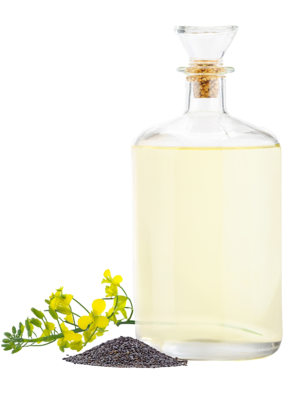Organic rapeseed oil
refined
| Origin | Mainly from Scandinavia and the Baltic States. |
| Certificates | EU organic, Kosher |
| Article number | 214122 |

| Origin | Mainly from Scandinavia and the Baltic States. |
| Certificates | EU organic, Kosher |
| Article number | 214122 |

Rapeseed oil is the fatty oil obtained by cold pressing the crushed, low-erucic acid seeds of Brassica napus L. and Brassica rapa L. (Cruciferae). The oil is then physically refined.
Clear and light yellow to yellow liquid with characteristic odor and taste.
Our refined organic rapeseed oil is sourced exclusively from long-standing partner farmers whose cultivation methods we know exactly and can track thanks to a fixed contractual partnership. Our agricultural experts are actively involved in the cultivation process, personally monitoring it in the fields and thus ensuring end-to-end traceability from sowing to oil production. This close cooperation allows us to directly influence the cultivation methods and thus guarantees the highest quality of our oil production.
In the production of our refined organic rapeseed oil, we attach great importance to strict quality controls, end-to-end traceability and sustainable practices. A versatile crop rotation that reduces the use of synthetic products to a minimum, improves the fertility of the soil and enables short transportation routes should be emphasized. The complete utilization of the rapeseed plant reduces waste and contributes to a healthy ecosystem. In addition, the cultivation supports the health and growth of local bee populations, which promotes the production of honey and further emphasizes the sustainability of our refined organic rapeseed oil.

Food
Due to its good heatability, the robust refined rapeseed oil is ideal for steaming and frying, for example in a pan. Deep-frying is also possible, but dedicated frying oils are more resilient in this case. It can also be used for people for whom cold pressed rapeseed oil tastes too intense, even for cold cooking.

The rapeseed for our organic rapeseed oil is cultivated extensively in a wide and varied crop rotation. This means that it generally takes between 5 and 7 years to grow rapeseed on the same field. Farmers ensure that soil fertility is maintained by cultivating legumes and keeping animals for several years. In addition, the extensive crop rotation reduces weed pressure and infestation with harmful insects such as the rape seed beetles. This cultivation is therefore a contrast to the usual practice in organic rapeseed cultivation. The industry often tries to compensate by purchasing organic fertilisers and pesticides. However, this is not very sustainable and does not correspond to the original idea of sustainable organic production with a closed nutrient cycle.
A further important advantage of the rape plant is that it can be fully utilised, so that no waste is left behind. This means that rapeseed straw can be left in the field after harvesting - it is an ideal humus-former. The roots of the rapeseed plant serve as nitrogen stores and loosen the soil. As a result, the use of fertiliser in the subsequent field crop can be significantly reduced. The press cake obtained during oil pressing is used as a high-quality protein feed.
During the flowering period, beekeepers set up their colonies near the fields. From one hectare of land the bees collect nectar for up to 100 kg of honey. The rape honey obtained has a mild taste, white to light beige colour and a creamy texture.
25,000
kg
Tank truck
900
kg
IBC
190
kg
Drum
27
kg
Canister
General durability: canister 12 months, drum 18 months, IBC 6 months
| Nutritional value | (per 100g) |
| Energy | 3,700 kJ / 900 kcal |
| Fat | 100 g |
| Saturated fatty acids | 7 g |
| Monounsaturated fatty acids | 65 g |
| Polyunsaturated fatty acids | 28 g |
Fatty acids ratio
Composition
| C18:1 Oleic acid | 50 – 67 % |
| C18:2 Linoleic acid | 16 – 30 % |
| C22:1 Erucic acid | max. 2 % |
Request now free of charge and without obligation from Gustav Heess. We deliver Rapeseed oil ...
We offer Rapeseed oil in the following packaging units: